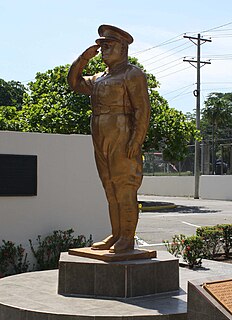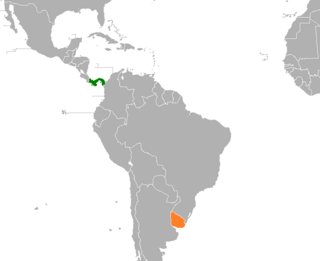DIPAL Party (Discipline, Equality, Patriotism, Love, and Liberty), (in Spanish: Partido DIPAL, PD, Disciplina, Igualdad, Patriotismo, Amor y Libertad) [1] was a Panamanian political party.

Spanish or Castilian, is a Romance language that originated in the Iberian Peninsula and today has over 450 million native speakers in Spain and in the Americas. It is a global language and the world's second-most spoken native language, after Mandarin Chinese.

Panama, officially the Republic of Panama, is a country in Central America, bordered by Costa Rica to the west, Colombia to the southeast, the Caribbean Sea to the north, and the Pacific Ocean to the south. The capital and largest city is Panama City, whose metropolitan area is home to nearly half the country's 4 million people.
A political party is an organized group of people who have the same ideology, or who otherwise have the same political positions, and who field candidates for elections, in an attempt to get them elected and thereby implement the party's agenda.
The DIPAL Party was created by Alfredo Alemán, in 1959 "as a non-political organization to foster better relations between negroes and whites in Panama ". [2]
Alfredo Alemán was a National Guard major under Commandant José Antonio Remón Cantera and later served as Minister of Finance in Remon's cabinet. [3]

Colonel José Antonio Remón Cantera was the 29th President of Panama, holding office from 1 October 1952 until his death in 1955. He belonged to the National Patriotic Coalition (CNP).
In 1960 it allied with the Popular Alliance and its candidate Víctor Florencio Goytía. In 1964 it allied with the National Opposition Alliance (ANO) and its candidate Juan de Arco Galindo. [4]
In 1964 the PD registered as a political party, joining the ANO, but polled barely 3000 votes. [2]
The PD was abolished by the Electoral Tribunal in 1964. [2]




